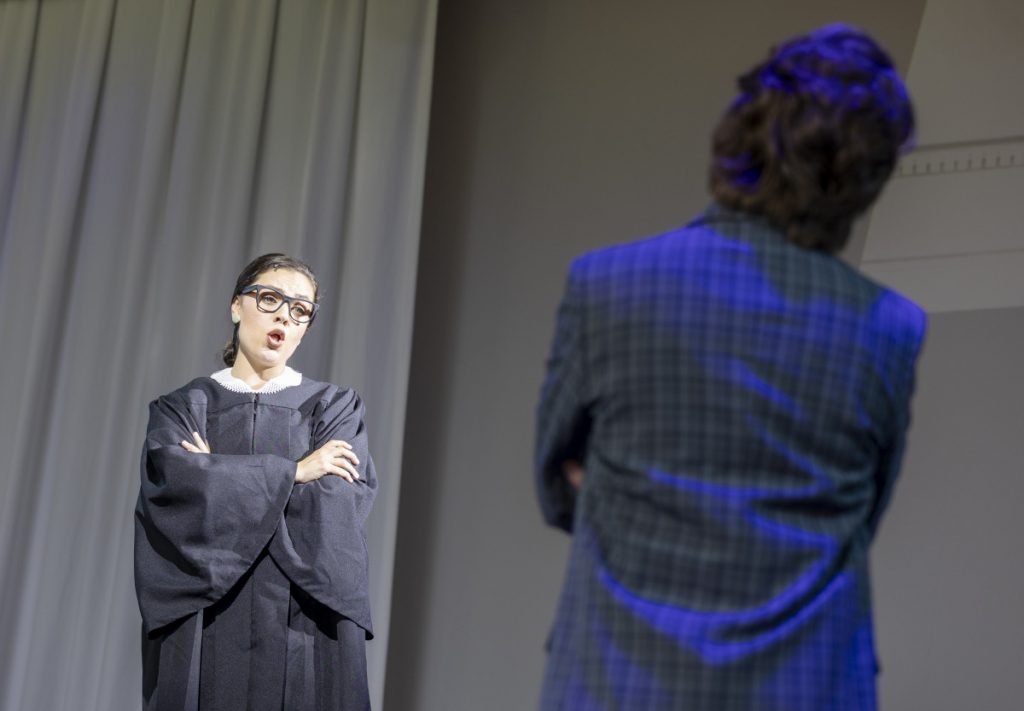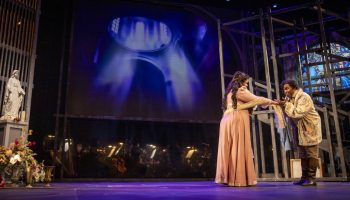DAVID KWIATKOWSKI – STAFF WRITER

It’s time for Supreme Court Justices Antonin Scalia and Ruth Bader Ginsburg to give their closing remarks in the form of beautiful arias as Chautauqua Opera Company’s Scalia/Ginsburg has its final performance at 4 p.m. Friday, Aug. 6 at the Performance Pavilion on Pratt.
The opera, written by Derrick Wang, is inspired by the real-life bipartisan close friendship between conservative Scalia and liberal Ginsburg.
Guest Artist Chauncey Packer, who portrays Scalia in the opera, said he does not align with Scalia’s political views, but has nevertheless enjoyed the opportunity to dive into the character and bring him to life for Chautauquan audiences.
“I was not thrilled to study him, but I’m very grateful and so enriched and edified by studying him and performing him (for) live audiences,” Packer said. “It’s been really good and it’s really been interesting. They’ve been different audiences every time and different energies, but yet very present. It’s been nice to play to a different audience, like sometimes they really love Scalia. Sometimes they really love Ruth, and there have been audiences that cheer for each one. It’s been really neat to do the show (during) this time.”
Young Artist Michael Colman, who portrays the Commentator, has played this role at Opera Carolina and Opera Grand Rapids. He begins another run as the Commentator after this one at Opera in The Rock in Arkansas. He likens the experience in this role as playing the same part as his idol, Samuel Ramey, in the role of Mephistopheles in Charles Gounod’s Faust or how Broadway actors portray a role eight times a week.
“You do the show because once you know the music, that will give you the sandbox,” Colman said. “Then you go to the next show, and they (tell you) the boundary so you just show up and play with what you are doing.”
The role is Colman’s ideal as something he can never get tired of doing.
“The range fits me really well because it’s from the high E flat to the low D, which is where I want to live all the time,” Colman said. “(Scalia/Ginsburg) has a lot of music theater tendencies where it needs to have that clear diction so that people can understand the words.”
The show’s central message is to put aside our differences and be able to find a sense of camaraderie and respect for the other person.
Scalia and Ginsburg were both avid opera fans — Ginsburg was at the 2015 premiere of this work — and when Scalia died in 2016, Ginsburg referenced Scalia/Ginsburg in an opinion piece for USAToday.
“Toward the end of the opera Scalia/Ginsburg, tenor Scalia and soprano Ginsburg sing a duet: ‘We are different, we are one,’ different in our interpretation of written texts, one in our reverence for the Constitution and the institution we serve,” Ginsburg wrote. “From our years together at the D.C. Circuit, we were best buddies. We disagreed now and then, but when I wrote for the Court and received a Scalia dissent, the opinion ultimately released was notably better than my initial circulation.”
Their disagreements were what challenged each other to do better in their positions and work harder at crafting their legal arguments.
“If you can’t disagree ardently with your colleagues about some issues of law and yet personally still be friends, get another job, for Pete’s sake,” Scalia has been quoted numerous times in describing their lifetime appointments.
“As annoyed as you might be about his zinging dissent, he’s so utterly charming, so amusing, so sometimes outrageous, you can’t help but say, ‘I’m glad that he’s my friend or he’s my colleague,’ ” Ginsburg was quoted as saying in a Washington Post piece from Irin Carmon, the co-author of Notorious RBG: The Life and Times of Ruth Bader Ginsburg.
Eugene Scalia, former secretary of labor for Donald Trump’s administration and the justice’s oldest son, wrote in an essay in The Washington Post that the message is that politicians are not going to live in harmony or get along just by spending more time together.
“What we can learn from the justices … — beyond how to be a friend — is how to welcome debate and differences,” Scalia wrote. “The two justices had central roles in addressing some of the most divisive issues of the day, including cases on abortion, same-sex marriage and who would be president. Not for a moment did one think the other should be condemned or ostracized. More than that, they believed that what they were doing — arriving at their own opinions thoughtfully and advancing them vigorously — was essential to the national good. With less debate, their friendship would have been diminished, and so, they believed, would our democracy.”
Former Sixth Circuit judge Jeffrey Sutton wrote an anecdote of one of his last times talking to Scalia in The Essential Scalia: On the Constitution, the Courts, and the Rule of Law. Scalia had bought two dozen roses for Ginsburg’s birthday, and Sutton questioned the motives of doing that when they differed so politically.
“So what good have all these roses done for you?” Sutton said. “Name one 5-4 case of any significance where you got Justice Ginsburg’s vote.”
“Some things,” Scalia answered, “are more important than votes.”
Packer’s father always told him that everyone has to live on this earth together, even after the fighting is over. It is something he has carried with him into this role.
“We have to see the differences, and we have to hear the differences, and hear each other’s experiences,” Packer said. “Then we can form a respectful way to live with each other. It’s OK to be different, and it’s OK that I may not like all of your differences, but we have to respect each other. We have to still live in the same lands, in the same neighborhoods or in the same country.”




